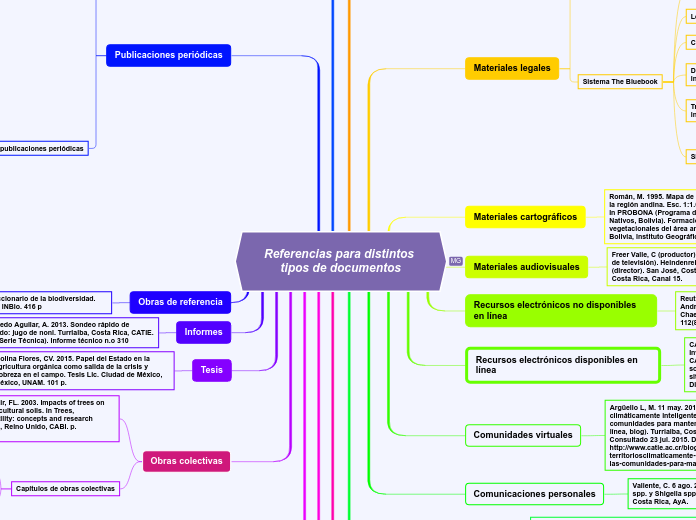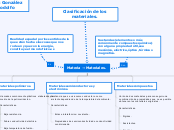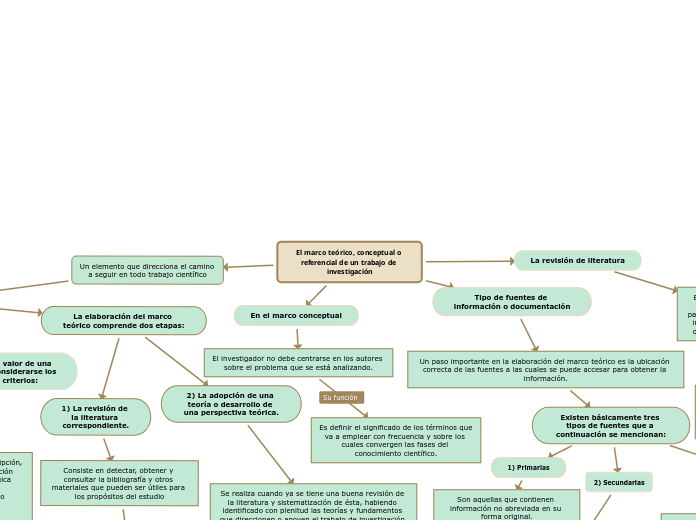MARIA BELEN GUTIERREZ MACIAS
Referencias para distintos tipos de documentos
The part of speech is a category to which a word is assigned according to its syntactic functions. In English the main parts of speech are noun, pronoun, adjective, determiner, verb, adverb, preposition, conjunction, and interjection.
Patentes
Blanco, L; Bernad, A; Salas, M (inventores); Consejo Superior de Investigaciones Científicas,
España; United States Biochemical Corporation (titulares). 1997. Reacciones de síntesis de DNA
(in vitro) que emplean DNA polimerasa de phi 29 modificada y un fragmento de DNA que codifica dicha polimerasa. Madrid, España, Oficina Española de Patentes y Marcas. Pat. ES 2103741 T3. 1 oct. 8 p.
Pósteres
Bautista-Solís, P; Vignola, R; Harvey, C; Avelino, J; Martínez, R; Trevejo, L; Chacón, M; Rapidel, B.
2013. Consistencies in expert and scientific knowledge about management practices that
reduce the impacts of extreme events on smallholder farming systems in Costa Rica (póster).
In Henry A. Wallace/CATIE: Serie Interamericana de Conferencias (7, 2013, Turrialba, Costa Rica). Turrialba, Costa Rica, Conservation International.
Ponencias
Vásquez, N. 2013. Mejoramiento de variedades de café. In Simposio de Roya del Café (1, 2013,
Turrialba, Costa Rica). Tapia Fernández, A; Pérez León, G (eds.). Memoria. San José, Costa Rica,
UCR. p. 16.
Obras colectivas
Capítulos de obras colectivas
Capítulo cuyo autor no es el editor del documento
Panta, A; Zea, B; Sánchez, D; Tay, D; Roca, W. 2013. Crioconservación de recursos genéticos de tubérculos y raíces andinos en el Perú. In González-Arnao, MT; Engelmann, F (eds.). Crioconservación de plantas en América Latina y el Caribe. San José, Costa Rica, IICA. p. 175-196.
Capítulo de un autor en su propia obra
Schroth, G; Sinclair, FL. 2003. Impacts of trees on the fertility of agricultural soils. In Trees, crops and soil fertility: concepts and research methods. Londres, Reino Unido, CABI. p. 1-9.
Schroth, G; Sinclair, FL. 2003. Impacts of trees on the fertility of agricultural soils. In Trees,
crops and soil fertility: concepts and research methods. Londres, Reino Unido, CABI. p.
1-9.
Tesis
A conjunction is a word like 'if' 'but' or 'and' which is used to connect sentences or clauses together.
Molina Flores, CV. 2015. Papel del Estado en la agricultura orgánica como salida de la crisis y
pobreza en el campo. Tesis Lic. Ciudad de México, México, UNAM. 101 p.
Subordinating conjunctions are conjunctions that are used at the beginning of subordinate clauses. Some examples of these conjunctions are: although, after, before, because, how, if, once, since, so that, until, unless, when etc.
Although it was raining, I went out.
Informes
A preposition is one of the most exciting parts of grammar. A preposition is used to describe the location of something in relation to something else.
Escobedo Aguilar, A. 2013. Sondeo rápido de mercado: jugo de noni. Turrialba, Costa Rica, CATIE.
20 p. (Serie Técnica). Informe técnico n.o 310
A group of words used with the force of a single preposition is called phrase preposition.
according to, by means of, owing to, with a view to, in place of, in front of, etc.
Obras de referencia
An interjection is used to express emotion in a sentence.
Think of other interjections!
Kapelle, M. 2008. Diccionario de la biodiversidad. Heredia, Costa Rica, INBio. 416 p
Publicaciones periódicas
An adverb is used to describe a verb, but it can also describe an adjective or another adverb.
Adverbs normally help paint a fuller picture by describing how something happens.
Referencias para publicaciones periódicas
Anuarios
RIABM (Red Iberoamericana de Bosques Modelo, Costa Rica). 2014. Anuario Bosques Modelo
de Iberoamérica. Turrialba, Costa Rica.
Boletines
OIE (Organización Mundial de Sanidad Animal, Francia). 2013. Boletín OIE. París, Francia. N.o 2013-01.
Separatas
Bonilla, LN; Mata Naranjo, R; Morales, ME; Salas, FCA. 2008. Maíz. Nairobi, Kenia, ICRAF. 50 p. Reimpreso de: Manual Granos Básicos, 3: Maíz (prácticas de cultivo, siembra, variedades, enfermedades y plagas, Costa Rica. San José, Costa Rica, Programa Nacional de Granos Básicos 3:1-14.
Artículos en diarios y otros periódicos
Barquero, M. 2013. Técnicos estiman baja del 18% en cosecha de café de este período. La
Nación, San José, Costa Rica; 12 jul.:23.
Artículos en continuación
Torres, V; López, V; Noda, A. 1993. Ejemplo de aplicación de técnicas multivariadas en
diferentes etapas del proceso de evaluación y selección de especies de pastos. Revista
Cubana de Ciencia Agrícola 27(2):131-135, 27(3):251-254.
Artículos en suplementos
Balbuena, O; Kucseva, CD; Gándara, FR; D’Agostini, A; Stahringer, RC. 2000. Efecto de la carga
animal, niveles y tipo de suplementación en la ganancia de peso vivo estival en recría de
bovinos. Revista Argentina de Producción Animal 20(supl. 1):61-62.
Tully, KL; Wood, SA; Lawrence, D. 2013. Fertilizer type and species composition affect
leachate nutrient concentrations in coffee agroecosystems. Agroforestry Systems
87(5):1083-1100.
Tsymbal, AA; Kadykalo, GI; Podol'-skii, SL. 1995. Using a mist installation for the propagation
of green cuttings (original en ruso). Traktory i Sel'skokhozyaistvennye Mashiny (8):21-22.
Volumen con otros datos diferentes al número:
Abend, SM; Kulish, N. 2002. The psychoanalytic method from an epistemological viewpoint.
International Journal of Psychoanalysis 83 pt. 2:491-495.
Sin volumen ni número:
Powles, H. 1987. Fencing off fish. Caribbean Farming feb. 1987.
Sin volumen y con número
Davies, SJ; Cavers, S; Finegan, B; Navarro, C; Lowe, AJ. 2010. Genetic consequences of
multigenerational and landscape colonization bottlenecks for a neotropical forest pioneer
tree, Vochysia ferruginea. Tropical Plant Biology (3):14-27.
Con volumen y sin número:
Kraemer, SM; Crowley, DE; Kretzschmar, DR. 2006. Geochemical Aspects of
Phytosiderophore-Promoted Iron Acquisition by Plants. Advances in Agronomy 91:1-46.
Con volumen y número:
Guerrero, EM; Revelo, JC; Benavides, O; Chaves, G; Moncayo, CA. 2014. Evaluación de sustratos en un cultivo de lechuga bajo un sistema hidropónico en el municipio de Pasto. Revista de Ciencias Agrícolas 31(1):3-16.
Libros y folletos
A numeral is a word or phrase that describes a numerical quantity.
Some theories of grammar use the word 'numeral' to refer to cardinal numbers that act as a determiner to specify the quantity of a noun, for example the 'two' in 'two hats'.
Balzarini, M; Di Rienzo, JA; Tablada, M; González, L; Bruno, C; Córdoba, M; Robledo, W; Casanoves,
F. 2011. Introducción a la bioestadística: aplicaciones con InfoStat en agronomía. Córdoba,
Argentina, Brujas. 383 p.
First, second..
Notas
Gunter, S; Louman, B; Oryazún, V. 2012. Criterios e indicadores para mejorar la capacidad de
monitoreo de los bosques y promover el manejo forestal sostenible: intercambio de ideas
para los procesos de Montreal y América Latina. Turrialba, Costa Rica, CATIE. 64 p. Incluye
resumen del taller «Uso de criterios e indicadores para mejorar la capacidad de monitoreo
de los bosques y promover el manejo forestal sustentable en América Latina». p. 45-49.
Comunicaciones personales
Valiente, C. 6 ago. 2008. Circulación de Salmonella spp. y Shigella spp. (mesa redonda). San José,
Costa Rica, AyA.
Comunidades virtuales
Argüello L, M. 11 may. 2015. Los territorios climáticamente inteligentes organizan a las
comunidades para mantener el ecosistema (en línea, blog). Turrialba, Costa Rica, CATIE.
Consultado 23 jul. 2015. Disponible en http://www.catie.ac.cr/blog/los-territoriosclimaticamente-inteligentes-organizan-a-las-comunidades-para-manejar-el-ecosistema/.
Recursos electrónicos disponibles en línea
CATIE (Centro Agronómico Tropical de Investigación y Enseñanza, Costa Rica). 2015. CATIE:
soluciones para el ambiente y desarrollo (en línea, sitio web). Consultado 14 oct. 2015.
Disponible en http://www.catie.ac.cr/es/.
Recursos electrónicos no disponibles en línea
An article is a word used to modify a noun, which is a person, place, object, or idea. Technically, an article is an adjective, which is any word that modifies a noun.
Reuther, K; Claßen-Bockhoff, R. 2013. Andromonoecy and developmental plasticity in
Chaerophyllum bulbosum (kindle). Annals of Botany 112(8):1495-1503.
Indefinite articles are the words 'a' and 'an.' Each of these articles is used to refer to a noun, but the noun being referred to is not a specific person, place, object, or idea. It can be any noun from a group of nouns.
A car in the parking lot.
Materiales audiovisuales
A pronoun is a word that can be used in place of a noun, typically after the noun itself has already been stated.
Freer Valle, C (productor). 2009. Gesta del 56 (serie de televisión). Heindenreich Brenes, A
(director). San José, Costa Rica, Universidad de Costa Rica, Canal 15.
Unlike demonstrative pronouns, which point out specific items, indefinite pronouns are used for non-specific things. This is the largest group of pronouns. All, some, any, several, anyone, nobody, each, both, few, either, none, one, and no one are the most common.
None, Several
Materiales cartográficos
An adjective is a word that's used to describe a specific noun and to provide more detail to the listener.
Román, M. 1995. Mapa de formaciones vegetales en la región andina. Esc. 1:1.000.000. Color.
In PROBONA (Programa de Bosques Andinos Nativos, Bolivia). Formaciones
vegetacionales del área andina de Bolivia. La Paz, Bolivia, Instituto Geográfico Militar.
Expresses a comparison between two entities or groups of entities in quality or degree.
He is taller than she is.
Materiales legales
A noun is defined as a person, place, thing or idea. Proper nouns always begin with a capital letter. Common nouns, which are general words, such as 'cars,' are not capitalized.
Sistema The Bluebook
Sistema autor-año
Asamblea Legislativa de la República de Costa Rica. 2010. Ley n.o 8787, Aprobación del
Protocolo de Enmienda al Contrato Suscrito entre el Gobierno de la República de Costa Rica y el Instituto Interamericano de Cooperación para la Agricultura (IICA) sobre el Centro Agronómico Tropical de Investigación y Enseñanza (CATIE). Diario Oficial La Gaceta 132(5). 8 ene.
Tratados, convenciones y otros acuerdos internacionales
Convención Marco de las Naciones Unidas sobre el Cambio Climático. Art. 2. 9 may. 1992.
Decretos, ordenanzas, resoluciones y otros instrumentos jurídicos nacionales
Decreto n.o 32967, 2006. Manual de instrumentos técnicos para el proceso de evaluación del
impacto ambiental (Manual EIA). Diario Oficial La Gaceta. Costa Rica. 4 may.
Códigos
Código de Trabajo, Ley n.o 2. 1943. Art. 3. Diario Oficial La Gaceta. Costa Rica. 27 ago.
Leyes
Ley Orgánica del Ambiente n.o 7554. Art. 17. Diario Oficial La Gaceta. Costa Rica. 28 set. 1995.
Constitución política
Constitución Política de Colombia. Art. 6. Colombia. 7 jul. 1991.
Compound nouns are words where two nouns have been stuck together to make a new noun. Compound nouns should be written as one word, without a hyphen.
Create sentences
Candlestick
Normas técnicas
A verb is an action word or 'doing' word that signifies movement in some way.
ISO (International Organization for Standardization, Suiza). 2010. Information and documentation
‒ Guidelines for bibliographic references and citations to information resources. Norma ISO
690-2010. Ginebra, Suiza. 14 jun.
A verb with its own meaning: a verb that is not an auxiliary verb.









